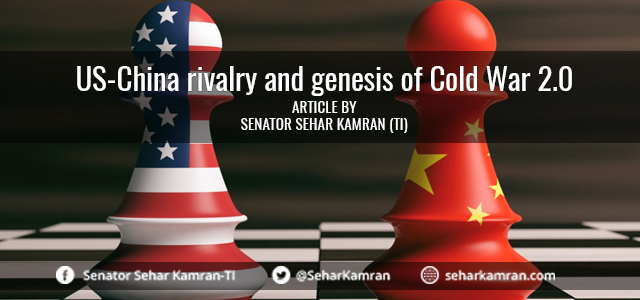By Senator Sehar Kamran (TI)
July 31, 2020
 United States President Donald Trump’s tenure has been marked by anti-China rhetoric from the outset, but the war of words between Washington and Beijing has intensified as the US moves toward a new presidential election.
United States President Donald Trump’s tenure has been marked by anti-China rhetoric from the outset, but the war of words between Washington and Beijing has intensified as the US moves toward a new presidential election.
The diplomatic turbulence between the two countries became apparent with the tariff and trade war. However, their bilateral ties took a nosedive when they recently ordered each other to shut down their consulates. In between, things were also deteriorating between them due to their opposing viewpoints on Taiwan and South China Sea, the imposition of new security laws in Hong Kong and circumstances created by the coronavirus pandemic.
In fact, the emergence of COVID-19 enhanced the bilateral tensions, with President Trump labeling the new pathogen as “the Chinese virus.” His rhetoric was obviously a political way to deflect public attention from his administration’s failure to handle the health crisis caused by the debilitating respiratory disease. Considering that a PEW survey in April revealed that “roughly two-third of Americans have a negative opinion of China” – the highest recorded percentage of anti-China sentiments in the US since 2005 – the Trump administration may also be using its vitriolic narrative to bag greater number of votes.
In the last few months, President Trump’s cabinet members, including Secretary of State Mike Pompeo, Defense Secretary Mark Esper and Attorney General William Bar, have doubled down on their anti-China rhetoric. In March, US agencies, such as the Department of Homeland Security and Federal Bureau of Investigation, accused China of “cyber hacking” to access data on US vaccines.
In the coming days, Islamabad, a close strategic partner of Washington and Beijing, may find itself between a rock and a hard place. It will not be possible for it to pick a side due to its strategic and economic compulsions. The country’s policymakers must therefore plan ahead, not only to protect our national interests but also to extract maximum political and economic mileage out of the situation.
Sehar Kamran
In May, the US released its “United States Strategic Approach to the People’s Republic of China” paper, which was nothing short of a scathing criticism of the Communist Party of China (CPC) and blamed Beijing for trying to “reshape the international system to align with (its party) interests and ideology.” The strategy paper accused the CPC of slow reforms and lack of political and social opening up of the country as promised in the 1970s. It also stated that China’s “expanding use of economic, political, and military power to compel acquiescence from nation states harms vital American interests and undermines the sovereignty and dignity of countries and individuals around the world.”
In June this year, the US began to rescind Hong Kong’s special status under an American law after China enacted its new security legislation to consolidate its control over the region. The US commerce department stated it was suspending “preferential treatment to Hong Kong over China, including the availability of export license exceptions.” In addition, President Trump signed an executive order on July 14 to suspend Fulbright program for mainland China and Hong Kong, accusing Beijing of “extinguishing Hong Kong’s freedom.”
On July 21, the US Justice Department accused China of sponsoring hackers who were purportedly trying to target labs developing COVID-19 vaccines and charged two Chinese for allegedly spying on US companies performing coronavirus research.
Subsequently, tensions between Washington and Beijing escalated and the US ordered closure of the Chinese consulate in Houston on July 22 by accusing it of “economic espionage.” The Chinese foreign ministry in its response warned the US “to carefully think” about the trajectory of the US-China relationship. Two days later, the authorities in Beijing ordered the US to close its consulate in the city of Chengdu while rejecting American allegations against it and describing them as “malicious slander.”
US Secretary of State Mike Pompeo recently made a speech in which he declared his country’s engagement with China “a dismal failure.” He further suggested to create a new global bloc of countries against Beijing, stating that it was imperative to have “a new grouping of like-minded nations” and “a new alliance of democracies.”
Secretary Pompeo, in a video message to the US-India Business Council’s summit, strongly criticized Beijing for “initiating” recent clashes at the Indo-China border and commended New Delhi on imposing a ban on the Chinese mobile apps.
It is evident from all these developments that new battle lines are being drawn that will have significant global ramifications. The tectonic plates of geopolitical alliances are shifting as the world slowly, but surely, moves toward Cold War 2.0.
The Chinese have already anticipated such a scenario since President Xi Jinping warned against the “Cold War mentality” in April. The deep freeze in the bilateral relations of the two major global powers will eventually divide the world. Washington and Beijing should convey their mutual grievances to each other and address them amicably.
In the coming days, Islamabad, a close strategic partner of Washington and Beijing, may find itself between a rock and a hard place. It will not be possible for it to pick a side due to its strategic and economic compulsions. The country’s policymakers must therefore plan ahead, not only to protect our national interests but also to extract maximum political and economic mileage out of the situation.
Same version of this article is posted on UrduPoint


